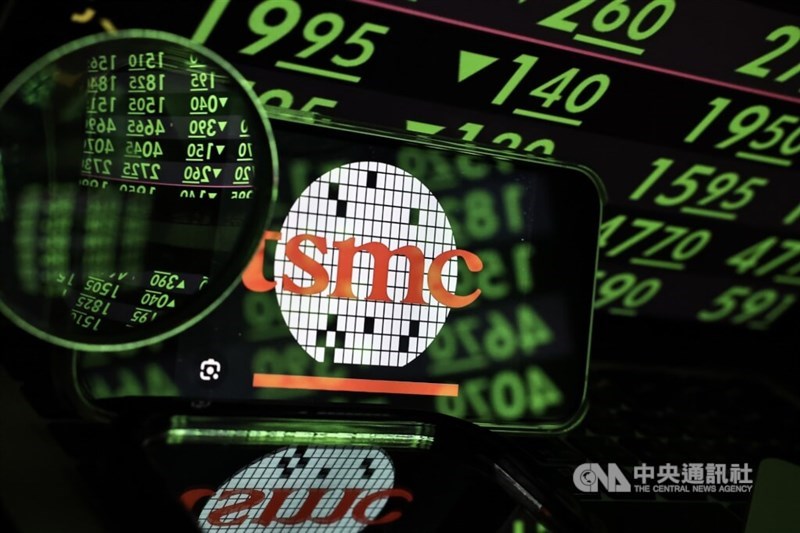
Taipei, Feb. 10 (CNA) Shares in Taiwan fell by nearly 1 percent Monday, led downward by the electronics sector amid fears that U.S. President Donald Trump will impose heavy tariffs on chips, dealers said.
The Taiex, the Taiwan Stock Exchange's benchmark weighted index, ended down 226.13 points, or 0.96 percent, at 23,252.14 after moving between 23,163.85 and 23,448.16. Turnover totaled NT$325.32 billion (US$9.9 billion).
The market opened down 0.24 percent and selling later accelerated, with much of it focusing on major semiconductor stocks.
With contract chipmaker Taiwan Semiconductor Manufacturing Co. (TSMC) trending lower throughout the session, the Taiex fell to the day's low with just under half an hour left before rebounding slightly at the end, dealers said.
After its American depositary receipts fell 2.08 percent on Friday, TSMC lost 1.78 percent in Taipei on Monday to close at NT$1,105.00.
The stock's losses contributed about 160 points to the Taiex's fall on its own and contributed to a 1.50 percent fall in the electronics index.
"It was no surprise that TSMC and other semiconductor stocks came under pressure today as market sentiment was hurt by Trump's tariff threats," Hua Nan Securities analyst Kevin Su said.
"The electronics sector attracted most of the selling today, accounting for about 70 percent of the total turnover."
On Friday, Trump threatened to impose reciprocal tariffs on countries around the world and 25 percent tariffs on all imported steel and aluminum sometime this week.
He also unnerved Taiwan on Jan. 27 when he said he would soon impose "tariffs on foreign production of computer chips and pharmaceuticals to return production of these essential goods to America."
"The incentive is going to be they're not going to want to pay a 25, 50, or even a 100 percent tax," Trump said at the time, and Taiwan's Ministry of Economic Affairs is planning on sending a delegation to the U.S. to discuss the issue on Tuesday.
Smartphone IC designer MediaTek Inc. lost 2.95 percent to end at NT$1,480.00, and Global Unichip Corp., TSMC's application-specific integrated circuit (ASIC) design subsidiary, shed 3.26 percent to close at NT$1,335.00.
Bucking the downturn, IC packaging and testing services provider ASE Technology Holding Co. rose 1.22 percent to end at NT$166.50.
On the back of a 0.90 percent increase in American AI chip designer Nvidia Corp. Friday, Taiwan's AI related stocks largely appeared resilient.
AI server maker Quanta Computer Inc. remained unchanged at NT$174.00, and AI graphics card vendor Giga-Byte Technology Co. rose 0.20 percent to end at NT$254.50.
But iPhone assembler Hon Hai Precision Industry Co., which also rolls out AI servers, including Nvidia's, lost 2.25 percent to close at NT$174.00.
Su said old economy stocks were also mixed, but the steel industry rose 3.55 percent as "Trump's 25 percent tariff threats on steel and aluminum boosted commodity prices."
China Steel Corp., the largest steel maker in Taiwan, rose 2.04 percent to end at NT$20.05 and Chung Hung Steel Corp. surged 9.59 percent to close at NT$20.00. In addition, Ta Chen Stainless Pipe Co. soared 10 percent, the maximum daily increase, to end at NT$41.90.
In the financial sector, which rose 0.54 percent, Fubon Financial Holding Co. rose 1.19 percent to close at NT$93.40, and Cathay Financial Holding Co. ended up 0.75 percent at NT$67.40.
"Investors should stay on the sidelines for the moment and wait for Trump's final decision on chips," Su said. "Semiconductor stocks could see further volatility in the short term."
According to the Taiwan Stock Exchange, foreign institutional investors sold a net NT$18.89 billion in shares on the market Monday.
- Cross-Strait
Packing for emergencies: 'Go bags' gaining steam amid rising war fears
07/04/2025 02:04 PM - Business
Taiwan shares close down 0.73%
07/04/2025 01:52 PM - Society
Tropical Storm Danas likely to form Saturday, could approach Taiwan
07/04/2025 12:30 PM - Business
TSMC to withdraw GaN semiconductor business in 2 years
07/04/2025 12:17 PM - Politics
Taiwan's ambassador to Holy See presents Letter of Credence
07/04/2025 10:55 AM